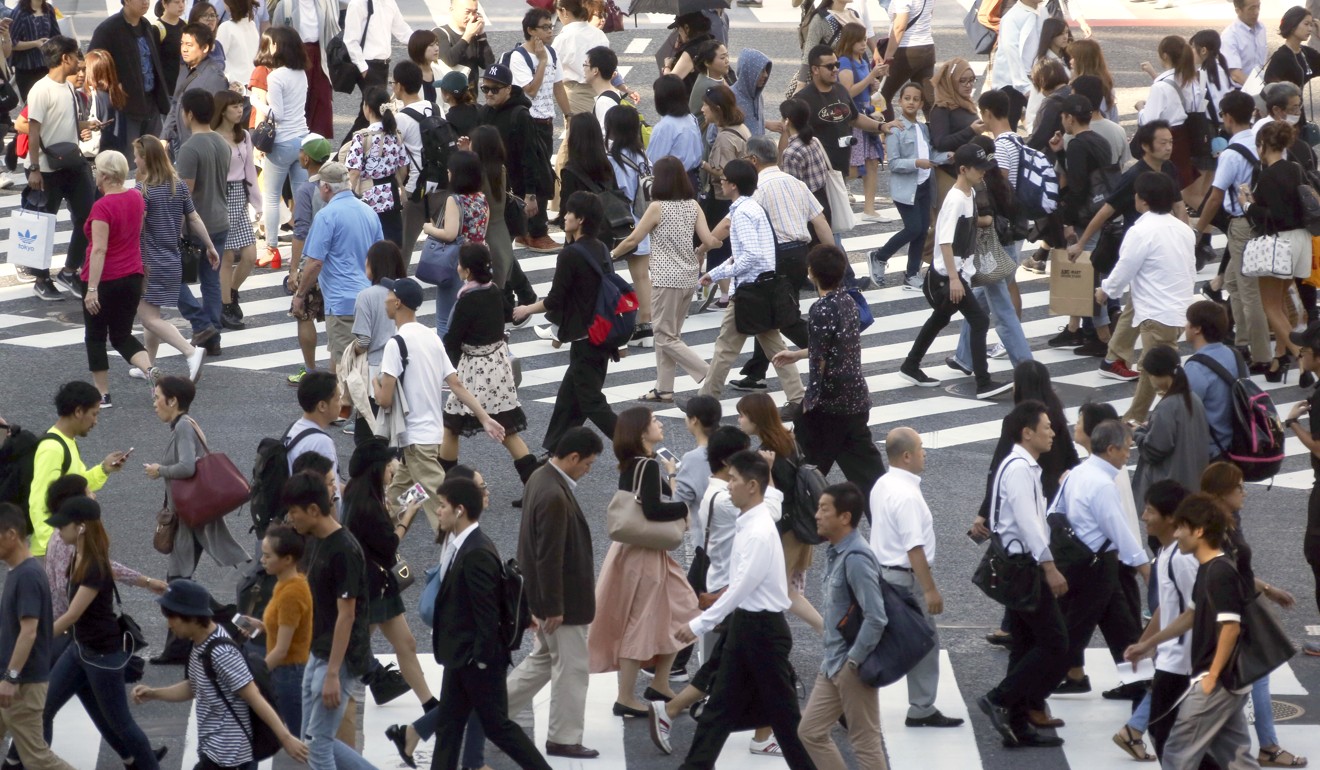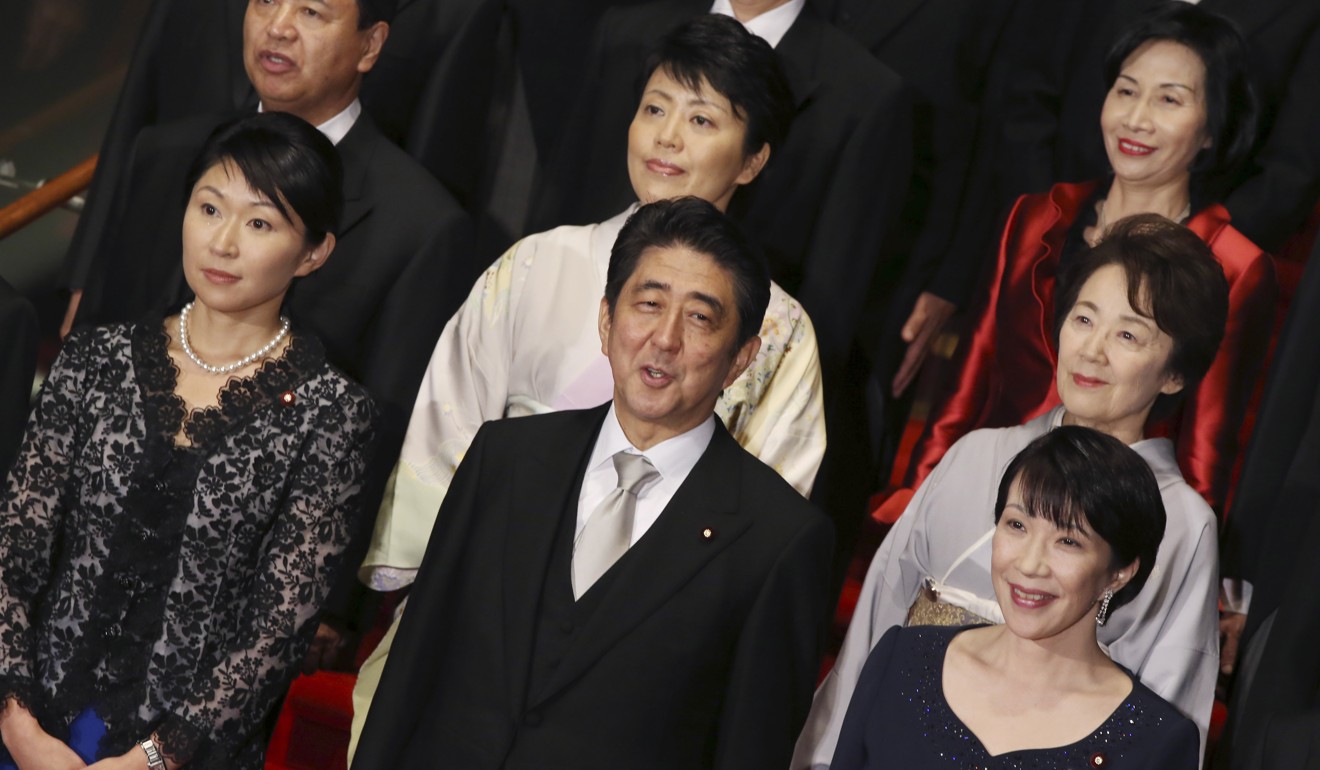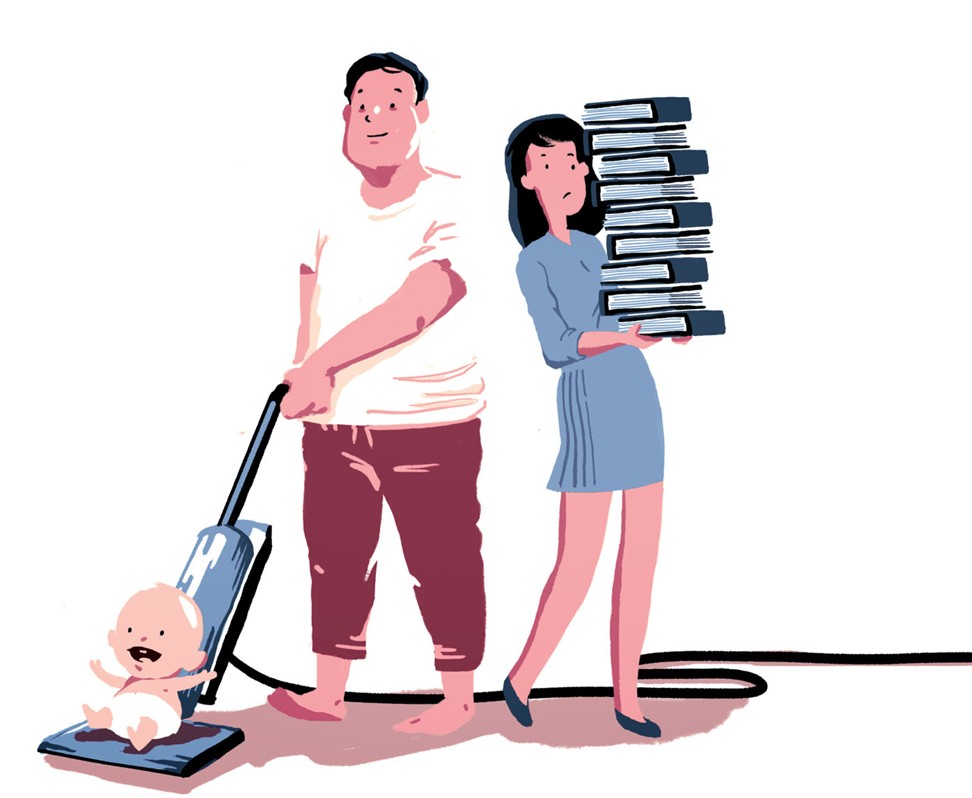
In Japan, the rise of the house husband redraws established gender norms
In a country where, for generations, a man’s job has taken priority over family life, a push to shift cultural gender roles is underway as the government struggles with a stubbornly low birth rate
Shuichi was 30 years old and working as a systems engineer at a technology company in the Japanese capital of Tokyo when he was diagnosed with sarcoidosis, an inflammatory disease that triggers growths in the body’s major organs. He had been married for a year and, given that his illness left him bedridden most days and unable to work, he did what he thought was the honourable thing and offered his wife, Kiyoko, a divorce.
“She reprimanded me and said, ‘I will go out to work and earn. You can stay at home and take care of yourself,’” he remembers. At the time, this was unheard of. It was the early 2000s, still very much the Japan of suited salarymen crowding onto trains with their briefcases; women had only been able to pursue careers for about a decade. (Before Japan enacted its Equal Employment Opportunity Law, in 1986, women were often barred from entering career-track jobs.)
Japan encourages fathers to take more active role in child care
Even if gender norms had not dictated that men should work and women should look after homes and children, a working woman would not have been able to afford to support her spouse, let alone any kids, with the low-paid administrative work or teaching jobs that were available to her.
By 2001, when Kiyoko had taken on the breadwinner role, more opportunities had opened up for women, but the idea of a man being a house husband was still outside the mainstream. Men would work gruelling 12- to 13-hour days while women would either stay at home with the children or work lower-paid jobs.
At his tech job, Shuichi regularly worked 120 hours of overtime a month. He did not have children at the time, and the colleagues who did rarely saw them. The situation had been almost the same during Shuichi’s own childhood: his father, a businessman, was often absent. Kiyoko had had a similar relationship with her salaryman father. Back then, fathers were familiar strangers in a family’s home.
The transition wasn’t easy when Shuichi first became a house husband. His wife had been working as a graphic designer, and she set herself on a path towards promotions and higher pay. At home, Shuichi felt the scrutiny of everyone around him if he went out to the grocery store during the day. So he dressed up.
“For a long time, when I felt well enough to go out I would put on my suit, even just to go to the store or do the dishes,” he says.
To be an adult man not wearing a suit and rushing to or from work would have marked someone out as abnormal. The common Japanese term for married, unemployed men was himo (“string”), a derogatory reference to their financial dependence on their wives.

Wearing a suit while browsing produce, Shuichi was indistinguishable from any other salaryman going about his daily business in Tokyo. After two years, with his wife’s salary increasing, Shuichi made a decision.
“I realised that we could increase our overall household ‘salary’ if I focused on supporting her instead of waiting to cure my disease, or forcing myself to go to work,” he says.
To mark this turning point, Shuichi cemented his role as an outcast: he dyed his hair blond. A Japanese man with bleached-blond hair wouldn’t stand out in most Western countries, or even in modern-day Tokyo but, at the time, Shuichi explains, it was a huge symbolic move.
“Until then, my thought was to go back into the workforce and back to society,” Shuichi says. “But in the public eye, men with blond hair are not allowed to work or even permitted to search for jobs as a salaryman. I became defiant and that is when I basically declared myself a house husband.”
Wanted: women business leaders in Asia-Pacific, and firms willing to support them
In the early 2000s, Japan had a plummeting birth rate, an ageing population (the country now has the oldest population in the world) and a growing labour shortage. This prompted the authorities to turn their attention to an underused labour force: women.
The government’s assumption had long been that women and their careers were the cause of declining birth rates: if women work, the thinking went, then they may postpone marriage and childbearing, or opt out altogether. Despite the lifting of the Japanese government’s ban on career-track jobs for women in the mid-1980s, companies continued to pay women far less than their male counterparts, promote women less frequently and funnel mothers into underpaid part-time jobs. (Japan was 114th out of 144 countries in the World Economic Forum’s gender equality rankings last year.)
In 2005, the government began looking for ways to make motherhood more appealing to working women, sending ministers to Scandinavia and France to bring home generous maternity- and paternity-leave policies and a blueprint for government-subsidised day care. Nothing seemed to work. Although the number of women in management in Japan began to inch up, the birth rate continued to drop.
As government officials began to meet with researchers throughout the country trying to understand the decline, it became clear that they had been focusing on the wrong gender. Women found motherhood unappealing not so much because of their jobs but because of the lack of involvement of their male partners.
In 2006 [...] men were spending about an hour a week on childcare and household duties while women were spending 30 to 40 hours over the same period. And those numbers had not shifted as the country had become more dependent on female labour outside the home
“Men – fathers – needed to be doing more housework and childcare,” says Masako Ishii-Kuntz, a professor and fatherhood researcher at Ochanomizu University, in Tokyo.
As someone who had been studying Japanese fathers for more than 20 years by the time the government came knocking in 2006, Ishii-Kuntz knew that men were spending about an hour a week on childcare and household duties while women were spending 30 to 40 hours over the same period. And those numbers had not shifted as the country had become more dependent on female labour outside the home. But that story wasn’t as simple as just “those lazy men who don’t want to help out around the house”. When the Ministry of Health, Labour and Welfare surveyed working fathers in 2008, it found that a third of them wanted to spend more time with their children and take paternity leave, but felt it would be frowned on by their bosses. For the older generation, spending time with their kids was just not something men did.
In 2008, the government began piloting the Ikumen Project, aimed at drafting policies that would make workplaces more father-friendly and funding cultural projects that would encourage dads to get more involved with their children. (The word “ikumen” is an amalgam of the Japanese “ikuji” [“child-rearing”] and the English “men”.)
China falls – again – in global ranking for gender equality
Signs began to appear in subways and on crowded streets: an American-inspired, film-poster-style hoarding of an actor dressed in a Superman costume, standing proudly with the word “Ikumen” emblazoned on his chest. Men could be seen actually engaging in fatherhood on television and in films and magazines. The popular manga-turned-movie Bunny Drop (2011; also known as Usagi Drop), for example, centres on office worker Daikichi Kawachi, who becomes an ikumen when he adopts his grandfather’s six-year-old illegitimate daughter. Every year the Ikumen Project would anoint a handful of celebrities (comedians, actors and pop stars) “ikumen of the year”.
In 2009, advertising agency Dentsu coined the term “papa danshi” – fathers who are “highly motivated in child-rearing” (“kosodate ni iyokuteki”) – and positioned such men as drivers of the child-rearing market. In much the same way that the West began seeing more male beauty and grooming products appearing on shelves from 2009 to 2015, Japanese markets saw the emergence of baby and children’s wares geared towards fathers – bubble bath targeted at dads, dad-friendly baby carriers and strollers, even a magazine devoted to cool dads, all marketed with lines such as “It’s great papas use it” (“Papa ga tsukatte yokatta”) and “Even papas can use this!” (“P apa de mo tsukaeru!”)

Shuichi had found a tribe. By 2012, he was not just a house husband but a stay-at-home dad, father to a son and, in 2015, he began meeting up with a group of other stay-at-home dads called Secret Society, Friends of House Husbands (Himitsu Kessha Shufu no Tomo). They consider themselves a step above ikumen, says Shuichi, whose son is now six years old.
“In terms of being proactive in the household, we consider ikumen to be passive,” he explains. “Ikumen is a part-time employee, whereas the house husband is a full-time employee who takes on a dedicated role.”
Feminist scholars have taken issue with the language, advertisements and media around ikumen, which tend to portray involved dads as heroic and fatherhood as patriotic. In a chapter on ikumen in the book Cool Japanese Men (2017), Cambridge University graduate student Hannah Vassallo writes, “Most notable here is the likening of ikumen to superheroes – hypermasculine icons who serve the nation through protecting the weak (children and mothers); and frame their roles more in terms of ‘support’, ‘consideration’ and ‘understanding’ for their wives – a sympathetic, but somewhat passive fathering model, leaving the gendered division of labour largely intact.”
Still, Vassallo goes on to say that the emergence of ikumen in Japan is promising evidence of a broader cultural shift. By 2015, slightly more men were taking advantage of ikumen policies: the percentage of men who took paternity leave (up to 12 months, paid for by the government) increased from 1.9 per cent in 2012 to nearly 3 per cent in 2015 and 7 per cent last year. (The government wants to see it hit 13 per cent by 2020.) Some fathers were beginning to leave work early – by Japanese standards; 6pm instead of 11pm – and the number of stay-at-home dads, although still a fringe minority, was growing.
How Hong Kong dads battle to balance work and family - and why men ‘feel pressured to show commitment to their work’
But the disconnect between the number of men wanting to take advantage of family-friendly policies and those who actually did so, what Ishii-Kuntz describes as the “disconnect between context and conduct”, persisted.
“They still mostly have bosses who think these policies are really strange,” she says. “They worry that if they take paternity leave or leave early, they’ll be penalised in some way.”
While the expectation that they became more involved at home had changed, men’s work requirements had not. Just as women were expected to work on top of full-time childcare and housework duties, men were being asked to add involved parenting to an already-long working week.
Enter the IkuBoss. In 2015, the government launched a programme aimed at changing the workaholic mindset of employers and bosses. Emerging alongside Prime Minister Shinzo Abe’s “work-style reform” proposal – which aims to decouple employees’ salaries from the number of hours they work, cap overtime at 720 hours a year, and require companies to pay “regular” and “irregular” employees the same rate for the same work – IkuBoss intends to change the work culture from the top down.

To take part in the IkuBoss Corporate Alliance, companies must make a public commitment to the initiative, then send executives to classes and workshops (conducted by non-profit organisation Fathering Japan, which has been instrumental in the Ikumen Project and runs dad groups throughout the country), publicise their successes and meet with other IkuBoss companies to share best practices. And then, if needed, bring on professional consultants (provided by IkuBoss) to address any issues.
So far, 184 companies have signed up to the programme. That’s not a large number in a country with tens of thousands of businesses, but Makiko Tachimori, vice-chairwoman of the Women in Business Committee of the American Chamber of Commerce in Japan, says, importantly, some of the early adopters have been large firms, such as cosmetics and personal care giant Shiseido.
“In Japan, it’s the big companies that really shift the culture,” she says. “They represent only 5 per cent of companies but, whatever they do, the medium and smaller companies follow, and the government, too, so we need to see all of them embracing this.”
Tachimori points out that the IkuBoss programme’s encouraging of management to be more flexible extends beyond childcare.
“Because there’s a growing need for elderly care, Japan being the fastest-ageing society in the world, even men have to chip in for elder-care,” she says. “So, it’s not just women and children any more, it’s men who also have to take [a leave of] absence from work to take care of their parents.”

Critics of Abe’s “work-style reform” plan worry that it won’t reduce overtime hours, just overtime pay, which could exacerbate the work-life imbalance and the birth-rate problem. Japanese economists have recently been writing in newspapers that reproductive decisions are heavily influenced by economic stability. In the decades that have seen a declining birth rate in Japan, the number of “regular” jobs (stable, full-time jobs with benefits) has also fallen, creating a large group of men who worry they can’t afford a family. That’s layered on top of the long-standing cultural notion of the proper order of a man’s life: job, marriage, child.
“When you are hired as a regular employee in Japan, you are hired for life,” Tachimori says. “Traditionally, the management mindset was like this: everybody works at the same company for their lifetime, lifetime employment is normal, the seniority system is normal, you don’t have to understand about childcare or housework because stay-at-home mums will take care of that.”
At a prelaunch interview for the IkuBoss programme in April 2014, Masako Mori, Japan’s minister for gender equality and declining birth rate, explained that Japanese companies needed to move beyond just adopting policies that supported working parents. They have to encourage employees to take advantage of those policies and make it clear that they will not be penalised for doing so.
“Just because there’s a company-wide system in place, it doesn’t mean people feel able to say they’re going to take time off,” Mori said. “So, we will have the bosses encourage them to do it: ‘Your kid is small, so go home early. The others will take up the slack.’”
Sexism sells: how Hong Kong adverts reinforce gender stereotypes
“I am ikuman!” Kiyonori Yamashita (who goes by the name Kiyo) tells me proudly over dinner with his son, Seiji, and wife, Lara. Elbowing each other and giggling throughout the meal, Kiyo and Seiji, 10, are clearly close. The 40-year-old is one of the hundreds of thousands of fathers across the country who now regularly show up at their son’s soccer games.
Kiyo says later that he’s been able to be more involved with his son in part because Lara, who is from Ireland, expects him to be.
“Maybe it’s because I have a Western wife,” he says. “If I had a Japanese wife, I might expect her to look after my son. Japanese mentality is that the mother is the main person to look after the kids.”
Tachimori says that while this idea that women take care of children and homes while men run companies has dominated modern history in Japan, there has been a shift in the past decade.
“Every year I see more fathers taking care of their children,” she says. “On the street or in TV dramas or in the media. You can see men doing fatherhood more and more all the time, so that is very encouraging. Those are the men in their 30s. Men and women in their 30s have a totally different mindset than people in their 50s. So we have high hopes for the younger generation.”
I still hear from a lot of career-focused young women who are struggling with their grandparents because those grandmothers and grandfathers say they feel sorry for their grandchild because their mother is working
Ishii-Kuntz echoes this, noting the increased number of men out with children on the streets, a visible shift from decades past when men would only be seen in suits rushing to or from work and children would only be seen with women.
“You see a lot more men in suits carrying babies, that’s a big shift,” she says.
In addition to working to shift the mindsets of older bosses at companies, change in Japan will require a transformation in schools and neighbourhoods, too, says Tachimori. And grandparents are likely to remain an obstacle.
“We still have a lot of elderly women who have never worked in their whole lives, and now they have become house grandmothers,” she says. “And we have so many men, too, who were never ikumen, never did housework, never did childcare, and now they are grandfathers. And I still hear from a lot of career-focused young women who are struggling with their grandparents because those grandmothers and grandfathers say they feel sorry for their grandchild because their mother is working.
“I personally experienced the same thing. Every weekend when we went to dinner at my mother-in-law’s house, she would say to my daughter, ‘I feel sorry for you because you cannot eat very well because your mum is working.’”
Has spring finally arrived for Japan’s zombie economy?
The best hope for progress may lie with those on the fringes, men such as Shuichi, whom the mainstream has long dismissed as house husbands or, as Ishii-Kuntz calls them, “vegetable-eating men”, and who are often compared with (or paired up with) “meat-eating [career] women”. Such men have helped enable Japan to dramatically increase the participation of women in the workforce in recent years (after lagging behind most of the developed world since 2000, Japan shot past the United States last year, with 76.3 per cent of women now in work), and domestic bliss is increasingly a viable alternative for those who find themselves unable to secure a high-paying full-time job.
“It used to be that I would ask my students [all women] about these men, and they would all wrinkle their noses and say, ‘I don’t know about those guys, they’re not very masculine,’” Ishii-Kuntz says of her charges, all training to be home economics teachers at Ochanomizu University. “But in the last year or two, it’s really changed. I’d say about half of them are actually looking for a vegetable-eating man.”
Text: Topic Magazine
